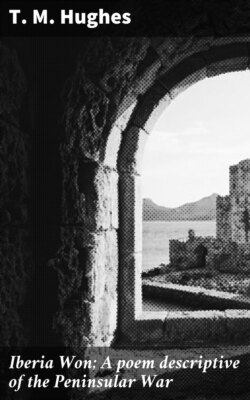Читать книгу Iberia Won; A poem descriptive of the Peninsular War - T. M. Hughes - Страница 6
На сайте Литреса книга снята с продажи.
ОглавлениеCantabrum indoctum juga ferre nostra.
Carm. ii. 6.
In a later ode Horace commemorates the subjugation of the Cantabrians, but it was only momentary, and the difficulty with which it was effected is acknowledged by the poet himself:—
Servit Hispanæ vetus hostis oræ
Cantaber, serâ domitus catenâ.
These are splendid tributes to the valour which resisted the then irresistible Roman power. The Cantabrian strength was broken, and they were temporarily subjected by Agrippa (Sueton. Octav. c. 20), but it was only to rise again the moment they had recovered their shattered forces.
Cantabria corresponded (as already observed) with the modern Basque Provinces, and gave with the neighbouring Asturia more trouble to the Romans than all the rest of Spain, the mountainous character of the country aiding them in that resistance to which they were prompted by the hardy mountaineer’s character, and by his inherent love of
The mountain-nymph, sweet Liberty!
“Two most powerful nations (says Florus, lib. iv. cap. 12), the Cantabri and the Astures, were still free from the Imperial sway. The determination of the Cantabrians was pejor (so the proud Roman calls it) and loftier, and more pertinacious in rebellion, for not content with defending their own liberty, they sought even to control their neighbours.... Beaten at last, they retired to the lofty mountain Vinnius, to which they deemed that the Ocean would ascend before the Roman arms.... But he in person drew them from these mountains, and reduced them beneath the crown by right of war.” Florus is here describing the last expedition against the Cantabrians in the reign of Augustus, of which Agrippa was commander. Suetonius gives the same narrative in substance in Octav. cap. xx., and Strabo, lib. iii. Silius Italicus pays even a still greater tribute to the indomitable spirit of the Cantabrians:
Cantaber ante omnes hyemisque, æstusque, famisque
Invictus.
Horace in that variety of refined flattery, with whose incense he knew how to intoxicate Augustus, returns frequently to his Cantabrian wars, and while his object is to praise the Roman pays unceasing tributes to Spanish valour. Thus:
Te Cantaber non antè domabilis
Miratur, ô tutela præsens
Italiæ dominæque Romæ!
Carm. iv. 14.
Again, commemorating the triumph of Agrippa under Augustus, in the year U. C. 733:
Cantaber Agrippæ, Claudî virtute Neronis
Armenius cecidit.
Epist. i. 12.
Agrippa was not the only one of Augustus’s generals, who was despatched to the conquest of Cantabria, and with dubious success. Lucius Æmilius had before failed in the attempt.
It is curious enough that the Britons, the Gauls, and the Spaniards are alluded to by name, and in the exact order of their greatness, in three successive lines of an ode of Horace:
Te belluosus qui remotis
Obstrepit Oceanus Britannis,
Te non paventis funera Galliæ,
Duræque tellus audit Iberiæ.
Carm. iv. 14.
Singular approximation of nations whose struggles in the Peninsular War were to make so famous near twenty centuries later!
In the Peninsula I do not expect much appreciation, where even amongst those who palaver English, English poetry is not at all understood, and where once a littérateur, expressing his sham admiration of Shakspeare, spoke to me of “Macabets as one progidy of a tradegy!” I am not prepared to sacrifice to an ambition which nothing but undue praise could conciliate, and I shall be satisfied with the approval of my own countrymen, if I can only have the good fortune to secure it.
Corunna, September, 1846.
